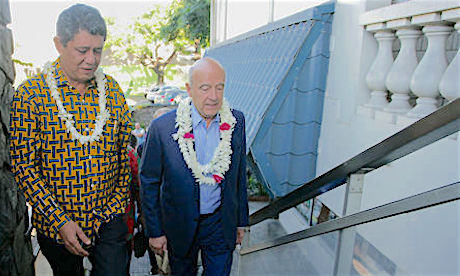Former French prime minister Alain Juppé has conceded France’s nuclear testing in the Pacific has impacted on the environment and peoples’ health.
Mr Juppé was Prime Minister from 1995 to 1997 under President Jacques Chirac, who made the controversial decision to resume nuclear testing in French Polynesia.
Mr Juppé, 70, is a member of the right-wing Les Républicains, and has been considering a bid for the French presidency in 2017.
The lobby trail last week led him to Tahiti where he met with several of the territory’s anti-nuclear organisations.
After a two-hour meeting, Mr Juppé emerged to say the assertion France held until 2009 that its nuclear testing programme was clean was not based on fact.
“The affirmation which was to say that nuclear tests were clean is not right,” Mr Juppé said.
“It is not the truth. Nuclear tests had, and still have, an impact on the environment which is worrying, it also has an impact on peoples’ health.”
Despite receiving more than 1000 applications, the French state only ever granted 19 people compensation for harm caused by nuclear testing at Mururoa and Fangataufa atolls between 1966 and 1996.
Current socialist president François Hollande also promised to revisit compensation laws when he visited Tahiti in February.
The legacy of decades of nuclear testing lingers in French Polynesia, where the effects of the 193 tests and the secrecy of the French state remained contentious.
It took until 2009 for Paris to acknowledge that harm had been done.
Frustrated with a lack of progress, the French Polynesian Assembly in 2014 passed a motion to ask France for close to $US1 billion in compensation, and Richard Tuheiava, an assembly member, last month pressed the case at the United Nations, something which Mr Juppé urged against.
“We will look for the path to reconciliation,” he said. “We need to trust each other again.”
Source
- radionz.co.nz
- Image: radionnz.co.nz
